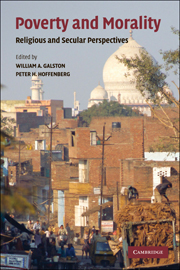Book contents
- Frontmatter
- Contents
- Contributors
- Acknowledgments
- 1 Introduction
- 2 Global Poverty and Unequal Development
- 3 The Karma of Poverty
- 4 Poverty and Morality in Christianity
- 5 Classical Liberalism, Poverty, and Morality
- 6 Confucian Perspectives on Poverty and Morality
- 7 Poverty and Morality
- 8 Hinduism and Poverty
- 9 The Problem of Poverty in Islamic Ethics
- 10 Jewish Perspectives on Poverty
- 11 Liberal Egalitarianism and Poverty
- 12 Marxism and Poverty
- 13 Poverty and Natural Law
- 14 Afterword
- Select Bibliography
- Index
12 - Marxism and Poverty
Published online by Cambridge University Press: 05 June 2012
- Frontmatter
- Contents
- Contributors
- Acknowledgments
- 1 Introduction
- 2 Global Poverty and Unequal Development
- 3 The Karma of Poverty
- 4 Poverty and Morality in Christianity
- 5 Classical Liberalism, Poverty, and Morality
- 6 Confucian Perspectives on Poverty and Morality
- 7 Poverty and Morality
- 8 Hinduism and Poverty
- 9 The Problem of Poverty in Islamic Ethics
- 10 Jewish Perspectives on Poverty
- 11 Liberal Egalitarianism and Poverty
- 12 Marxism and Poverty
- 13 Poverty and Natural Law
- 14 Afterword
- Select Bibliography
- Index
Summary
Religions, Emile Durkheim tells us, are systems of practices and beliefs that maintain social cohesion by inculcating norms and rules of conduct. Their function is to join individuals together into societies. So conceived, they need not be theistic; thus the “primitive” religions he studied were, at most, pretheistic, and the religions of the scientific age that Durkheim, along with other positivists, envisioned will not be theistic either. But all religions that persist for significant periods of time would have ethical traditions associated with them; after all, establishing rules that guide individual conduct is what religions do. Thus, all the so-called world religions have ethical traditions. But this is less true of traditions of thought that are not exactly religions in their own right. Natural law theories, which intersect with some of the world religions – Catholic Christianity, especially – occupy a different conceptual space. Natural law theory is a kind of moral philosophy – like utilitarianism or Kantianism, to cite pertinent modern examples. A moral philosophy is a philosophical theory, not an ethic. It can help shape ethics, but the connections are seldom direct. The situation is different yet again with political movements – feminism, liberalism (in its egalitarian and libertarian versions), and Marxism, insofar as they do not rise (or fall) to the level of religions in Durkheim’s sense. In its (big-C) Communist version, Marxism was more susceptible than the others to taking a religious turn. Thus, it was not uncommon for opponents, and sometimes also neutral observers, to call Communism or some version of it – Stalinism or Trotskyism or even Leninism – religions. Needless to say, this was not a description self-identified Marxists welcomed. It is questionable, too, how apt it was. Insofar as there is anything to the description, it pertains to an aberrant phenomenon within the larger Marxist political and theoretical tradition, one that is plainly at odds with the letter and spirit of Marx’s thought. Thus, it makes more sense to group Marxism with liberalism than, say, with Catholicism or Islam or, as Stalin’s critics would have it, Eastern Orthodoxy.
- Type
- Chapter
- Information
- Poverty and MoralityReligious and Secular Perspectives, pp. 242 - 264Publisher: Cambridge University PressPrint publication year: 2010



